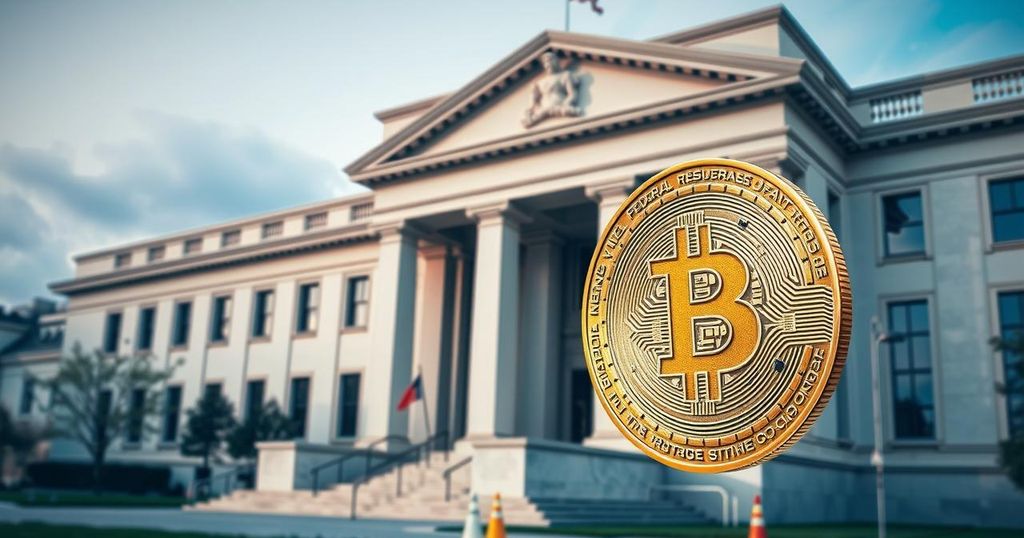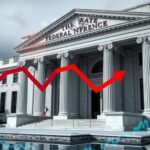Federal Reserve’s Stance on Bitcoin: Legal Barriers and Future Prospects
Federal Reserve Chair Jerome Powell has ruled out the possibility of the Fed holding bitcoin, citing legal restrictions from the Federal Reserve Act. While discussions about integrating bitcoin into the financial system continue, cryptocurrencies remain excluded from the Fed’s portfolio due to their speculative nature and volatility. Proposed plans for a national bitcoin reserve under the new administration highlight the tensions between regulation and innovation in the cryptocurrency sector.
On Wednesday, following a rate cut, Federal Reserve Chair Jerome Powell firmly reiterated that the central bank will not hold bitcoin, citing existing legal constraints as the reason. He emphasized that the Federal Reserve Act regulates the types of assets the Fed can own, stating, “We’re not allowed to own bitcoin. The Federal Reserve Act says what we can own, and we’re not looking for a law change.” Powell’s cautious stance towards cryptocurrencies has been consistent; he has previously labeled bitcoin as a speculative asset due to its extreme volatility and lack of reliability as a currency.
The Federal Reserve Act restricts the central bank’s asset holdings to U.S. government bonds and similarly secure instruments. Despite occasional purchases of assets during economic crises, such as the 2008 financial crash, cryptocurrencies remain excluded from the Fed’s portfolio. However, there have been legislative pursuits, notably Senator Cynthia Lummis’ Bitcoin Act, aimed at integrating bitcoin into mainstream financial frameworks, which face legislative hurdles due to the cryptos’ regulatory ambiguity.
Speculation regarding a U.S. national bitcoin reserve has surfaced following remarks from President-elect Donald Trump, who intends to acquire large bitcoin holdings to establish the U.S. as a leader in cryptocurrency. This plan could involve utilizing assets obtained from criminal investigations to create a reserve, boosting bitcoin’s market value amidst investor optimism about potential regulatory adjustments. Trump’s administration also reflects a growing movement towards the adoption of digital assets, as evidenced by his appointment of David Sacks as a crypto advisor.
In summary, while there is increasing discussion about the potential for a national bitcoin reserve under the Trump administration, the Federal Reserve’s current legal framework expressly prohibits it from holding bitcoin. Powell’s statements reflect a broader skepticism towards cryptocurrency as a stable investment, emphasizing the ongoing regulatory challenges that hinder its acceptance in formal financial systems.
The Federal Reserve plays a critical role in managing the monetary policy of the United States, which includes strict regulations on the types of assets it can hold. This limitation raises important questions regarding the future of cryptocurrencies like bitcoin within the framework of U.S. regulation. As corporations and governments increasingly consider the integration of digital currencies, the Fed’s position is pivotal in shaping the national cryptocurrency landscape. Recent proposals to create a national bitcoin reserve reflect a desire among some lawmakers to harness the advantages of cryptocurrencies, despite the prevalent concerns regarding their volatility and regulatory oversight.
In conclusion, while the possibility of integrating bitcoin into the U.S. financial system is being actively discussed, the Federal Reserve remains legally precluded from owning bitcoin. Jerome Powell’s unwavering skepticism toward cryptocurrencies underscores the challenges in approaching such innovations responsibly. Legislative efforts continue to seek a pathway for bitcoin within regulated frameworks, yet significant opposition remains due to concerns over the asset’s speculative nature. The ongoing dialogue about a national bitcoin reserve demonstrates the evolving dynamics of cryptocurrency policy in the U.S.
Original Source: news.bitcoin.com








Post Comment